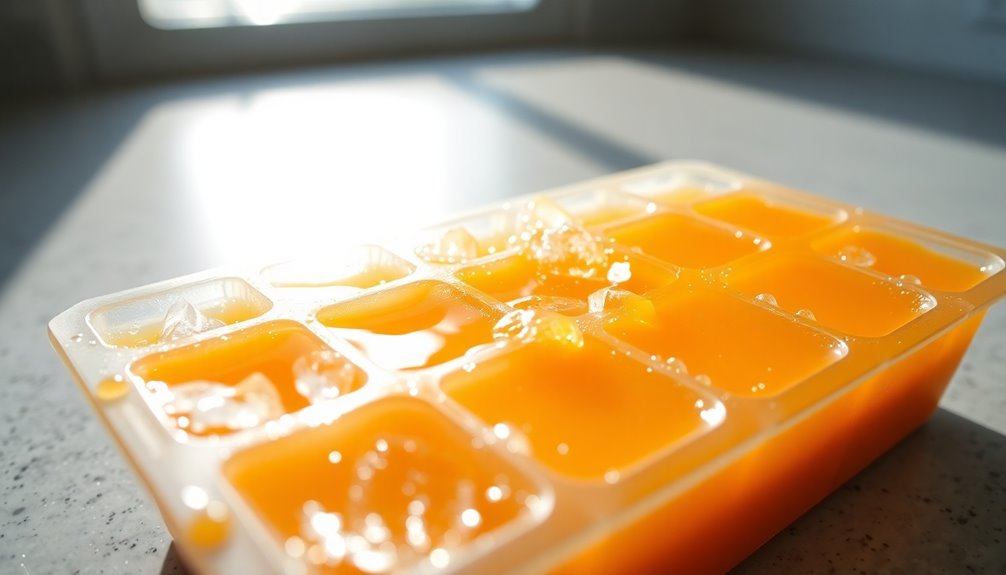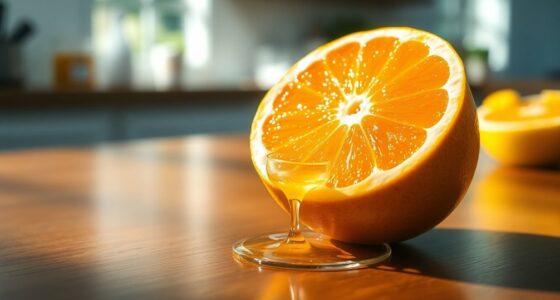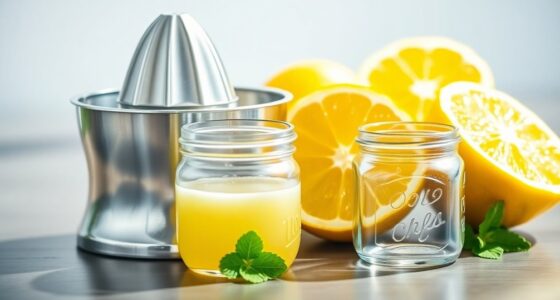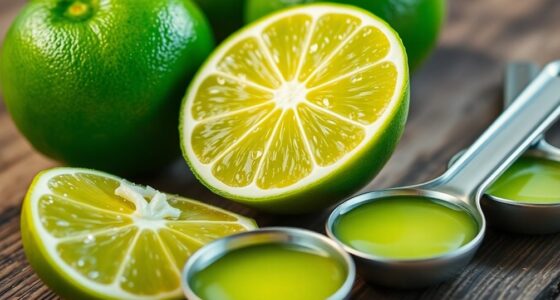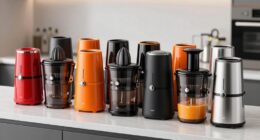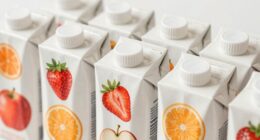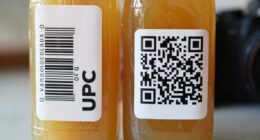Juice usually takes about 12 to 16 hours to freeze in a standard home freezer at 0°F (-18°C). However, the time can vary based on the juice's water content and how much you're freezing. If you're using ice cube trays, freshly made juice can freeze in just 3 to 4 hours. To get the best results and preserve quality, there are some helpful tips and methods you might want to consider.
Key Takeaways
- Juice typically takes 12 to 16 hours to freeze in a standard home freezer at 0°F (-18°C).
- Freshly made juice can freeze in about 3 to 4 hours using ice cube trays.
- Freezing time may vary based on the juice's water content and volume.
- Larger volumes of juice will require longer freezing times than smaller amounts.
- For optimal quality, use a blast freezer, which freezes items faster and retains nutrients better.
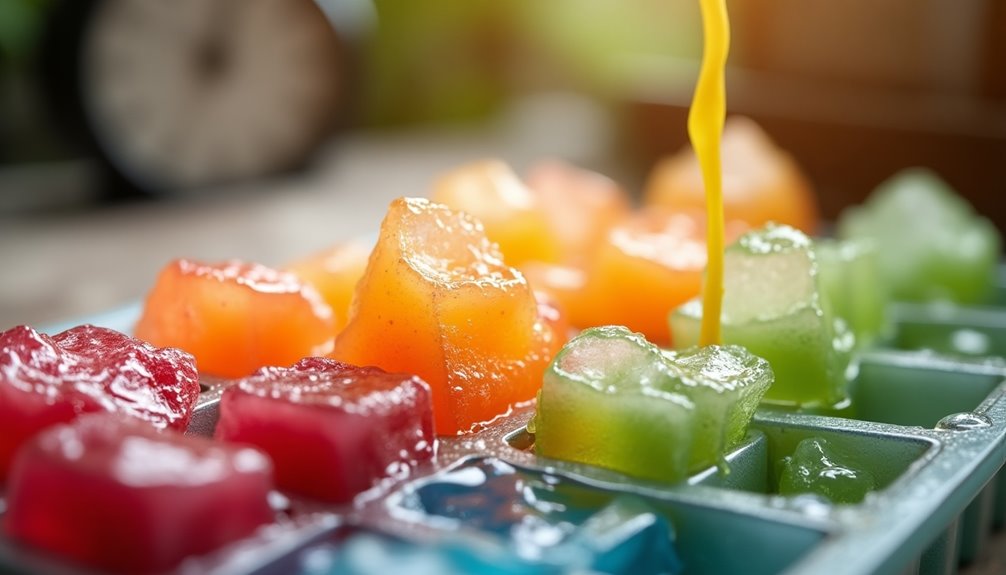
When you're looking to freeze juice, you can generally expect it to take about 12 to 16 hours in a standard home freezer set at 0°F (-18°C). This timeframe can vary based on a few factors, like the water content of the juice and the size of the container you're using. If you're dealing with a larger volume of juice, it might take a little longer to freeze completely.
On the flip side, if you're freezing freshly made juice, you might want to consider using ice cube trays, which can allow your juice to freeze in approximately 3 to 4 hours. This is a great option if you're looking to quickly use the juice in smoothies or other recipes.
When you freeze your juice, it's essential to be mindful of how full you fill your containers. It's recommended to fill them only up to 70% full before freezing. This precaution helps avoid issues with expansion, as liquids tend to expand when frozen. Following this tip ensures your containers won't break or leak, and you can maintain the quality of your juice.
If you're aiming for optimal quality and nutrient content, using a blast freezer is your best bet. A blast freezer freezes items much faster than a standard freezer, which helps preserve the nutritional value of your juice. Rapid freezing minimizes the formation of large ice crystals that can damage the cellular structure of the juice, protecting its flavor and nutrient content.
When you're making juice, you want to ensure that its freshness and health benefits remain intact, and using a blast freezer can help achieve that.
Once you've frozen your juice, the shelf life significantly increases. Frozen juice can last for months without losing much of its nutritional value, making it a practical choice for those who like to prepare in advance. However, keep in mind that while freezing helps preserve the juice, it's best to consume it within six to eight months for optimal taste and nutrient retention.
When you thaw your juice, it's advisable to do so in the refrigerator rather than at room temperature. This method helps maintain its flavor and nutritional value. You can enjoy the convenience of having your favorite fruit juice ready to go whenever you want, whether you're using it in a smoothie, mixed drink, or just on its own.
Frequently Asked Questions
Does Juice Freeze Faster Than Water?
No, juice doesn't freeze faster than water.
In fact, the sugars and solids in juice lower its freezing point, making it take longer to freeze.
While water freezes solid in about 1-2 hours, juice can take 4-6 hours or more to reach the same state. This difference in freezing times can be attributed to the sugar content and other components present in juice compared to plain water. The higher sugar concentration in juice lowers its freezing point, causing it to take longer to solidify. Consequently, if you’re wondering, “how quickly does pineapple juice work” in terms of freezing, you can expect it to require the same extended period as other fruit juices.
If you've got juice with pulp or fibers, that can slow the freezing process even further, insulating the liquid and reducing heat transfer.
How Long Does It Take Liquid to Freeze in the Freezer?
When you place a liquid in the freezer, its freezing time varies based on factors like volume and temperature. Typically, smaller portions freeze faster than larger ones.
For instance, if you're using ice cube trays, you can expect them to freeze in about 2 to 4 hours. However, larger quantities might take 12 to 16 hours.
To ensure efficient freezing, fill containers no more than 70% full to accommodate expansion.
How Long Does It Take for a Juice Box to Freeze?
If you're wondering how long it takes for a juice box to freeze, it usually takes about 4 to 6 hours in a standard freezer.
You might notice the edges starting to freeze within 1 to 2 hours.
For quicker results, consider using a blast freezer, which can cut that time to under 2 hours.
Just remember to leave some space in the box for the juice to expand as it freezes!
Can You Freeze 100% Juice?
Sure, you can freeze 100% juice!
It's like a time capsule for flavor, preserving its nutrients while giving you a refreshing treat later.
Just make sure you use glass containers filled only 70% full to avoid breakage.
While it'll retain most of its nutritional benefits, expect slight texture changes when you thaw it.
To keep it fresh, seal those containers tight and label them with the freezing date for easy tracking.
Conclusion
In the grand dance of time and temperature, juice twirls gracefully toward freezing, usually within two to four hours. Just like a painter waits for their canvas to dry, you'll find patience rewards you with a refreshing treat. As the liquid transforms into icy gems, remember that nature's rhythm is your cue. So, next time you pour that vibrant juice, envision a frosty ballet unfolding—one that'll leave you savoring the cool sweetness of your creation.
Cindy thoroughly researches juicing trends, techniques, and recipes to provide readers with practical advice and inspiration. Her writing style is accessible, engaging, and designed to make complex concepts easy to understand. Cindy’s dedication to promoting the advantages of juicing shines through her work, empowering readers to make positive changes in their lives through the simple act of juicing.

